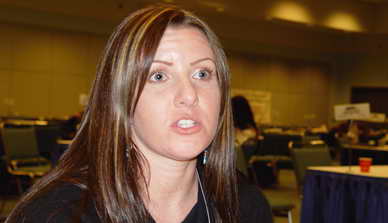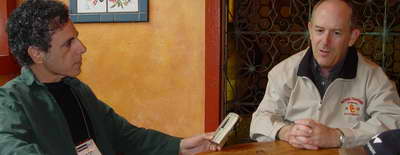|
|
 |
|
| |
Screenwriting
|
| |
 |
Summing Up Screenwriters Expo 3
On the last day of Expo, I was still pretty confused about what all the “experts” were saying about the best way to crack the screenwriting racket, so I spent some time with Tina Jones. Jones is a former music publicist who is now an acquisitions executive for Atlas Entertainment/Mosaic Media Group which produced “12 Monkees,” “City of Angels”, “Skooby I & II”, “The Coming Out” and other very successful features.
 |
| Tina Jones, Acquisitions Executive, Atlas Entertainment/Mosaic Media Group |
“I look for the next movies we are going to make and work with writers,” Tina told Filmmakers. “If we feel it’s already ready to go we attach talent or directors.”
Asked what kind of material Atlas is in the market for, Jones replied “We’re looking for a little bit of everything, supernatural thrillers, broad comedy, psychological thrillers and we’re also looking for things like “A Beautiful Mind”, “Elizabeth’, action, drama, etc.”
“What we are looking for basically is the story, so even if it’s an historical drama, which are generally more difficult, we would take a look at that if it’s a really solid story” she said “We generally work in the mid-to-high budget range.”
So what did she think of this year’s crop of budding screenwriters as compared to those who pitched their stuff at Expo 2?
“Comparing what I’m hearing this year to what I heard last year, I would say the story ideas are petty well rounded. We’re getting a broad base of different genres which is nice and refreshing. It seems like the writers are definitely more prepared for pitching this year. They came a lot more aware of how to pitch, which questions to ask which is really refreshing.”
How does that shake down in terms of spec scripts she’d really want to read?
“I’d probably want to see about 40% of what I’ve heard,” Jones said and noted that it’s usually more in the range of 10% at pitch fests “That’s if your lucky, in terms of peaking your interest”. Based on those stats, this bunch was scoring high marks in presentation. In terms of the future and what studios are looking for, Jones said there isn’t one particular direction or genre that looks like it’s going to be the hot ticket in the following season.
“It’s going in a variety of ways,” she believes. “There are some companies who will still only go down a road that is commercially viable but I also think there are a lot of stories that would normally fall under an independent producer’s belt. I think those are being a little more recognized and picked up by larger companies. I think that’s becoming the trend: a lot of smaller films and remakes are becoming more popular.”
What she was getting at is that, when it comes to stories, plots, ideas that are marketable and commercially viable, these will always find a buyer/producer no matter what is hot and what is not.
“A good idea is a good idea. Even if the project is not for us specifically, we could help the writer with referrals to our independent production associates or smaller companies.”
And Jones is not of the opinion that you necessarily have to be in Los Angeles to find the right buyer for your project or get your name and work in front of the people who can kick-start your career.
“I used to think it wasn’t a necessity to live in Los Angeles to make it in the film industry,” Jones said. “You don’t have to, but being here to be able to take meetings in person and go out with your agent or manager is a big plus. You’re just accessible. But I think it is possible to be a successful writer without living in L.A.”
You may have noticed, I was getting a lot of conflicting, confusing information and opinions from different people at Expo 3 about where you have to live, who you have to know, which courses you have to take to make it in this industry.
I needed a break and a reality check.
So I hightailed it out of the Convention Center and over to a nearby hotel to have a chat with “Secrets of The Screen Trade: From Concept to Sale” author, Allen B. Ury, Lone Eagle Publishing, 2005. Ury is a staff writer for Fade In and has sold screenwriting projects to Disney, New Line and others.
 |
| Jeff, FilmMakers.com & Allen B. Ury, Author, “Secrets of The Screen Trade: From Concept to Sale” |
I met Ury early in the morning, far enough away from the hype and hysteria of Expo 3, to get what I thought would be an objective, professional appraisal of making it in the screenwriting trade and a free cup of coffee. I had to buy my own coffee but I got a lot of the former and that ain’t bad.
“When I write and teach and when I write for myself, my approach has always been to look at Hollywood as a business, as an industry,” Ury told me. “There is art, just as there is art in architecture in engineering and in medicine, but there is also a science,” he said. “But, especially in movies, we are dealing with an industry, it’s commerce, a product. Entertainment is America’s second largest export behind aerospace. Billions of dollars are invested and most studios now are corporate entities. If you go in and say ‘I’m going to go in and show the world what a great artist I am and have someone invest $80 million in my vision,’ you’re going to be sorely disappointed.”
These are some of the most sagacious words and this is the one indisputable verity about the filmmaking industry I heard at Expo 3. You should write it down and paste if over your computer. Abbreviated, Ury was simply saying that the movie business is a business. An art, sure. But if you aren’t thinking commerce and commercial viability when you hammer out your next screenplay, pitch, synopsis, you just ain’t in the ball game.
Ury says writing from the heart, with passion and all those other art-inspired motivations is great but you also have to take reality into consideration. “You have to write what people want to buy,” he says. I think it’s important to note here that Ury is a family man. He has a wife and a son in college and all the other expenses that go with being a working man in America and so it only figures, when it comes to making a living as a writer in Hollywood, his vision is very much informed by reality, by what sells in addition to what moves or inspires him as a writer.
“It’s one thing if you are writing an independent film that you are going to finance yourself for $50,000 or you’re able to get a limited partnership that will bring in two or three million dollars,” Ury said. But he adds it’s a completely different story if you are writing scripts you hope to sell to the studios or that will get you an agent. These people, the players, he says, are interested in what sells not in what your artistic vision is.
That’s not what the thousands of attendees were consistently hearing at Expo 3. They were being told by dozens of “experts” in seminars and by book peddlers and script consultants that if they get with the program and follow the three-act structure and their passion as writers they’re gonna’ make it, too!
I asked Ury how writers negotiate this mazy of opinions and sales pitches and reconcile it with the business realities of the film industry. He said “Just look at what works and what doesn’t. Go to the movies. What is being bought? Read Variety and The Hollywood Reporter. What’s being produced and what is getting the green light and why?”
This is as good a guide as your going to get at any screenwriters expo or pitch fest or seminar. A very reliable guide to what kind of product is marketable is what you are paying eleven or twelve bucks for on Saturday night. Or you can go to UCLA for four years. But even after you figure out what they’re buying out there, that’s only 15% of the battle.
“Most of the Hollywood culture is based on trust,” Ury says. “There are certain people the industry trusts with their money, whether it’s directors, producers and so they get certain people because of their track record. It’s always about track record and it’s not always necessarily successful track record. You just have to have enough other people to say yes to someone to get other people to say yes to the same person. So, even if someone has had a bomb or string of bombs and you ask that person why they are getting all the work and you, the unproduced writer/direct/producer are not getting any work, the guy or gal who just bombed is going to tell you ‘Well, at least I’ve got a track record. I’ve got 15 films I’ve done and you’ve done none so who are they going to trust? Even if my 15 films haven’t made money, someone has said yes to them and that allows other people to say yes to them’”
No one who knows anything in this industry is going to dispute that. It’s the gospel out here and it really boils down to one word: Relationship.
Hollywood is notoriously nepotistic, not just in terms of dealing with blood relations but also people you have deals with on studio lots or in the same production company or studio or co-producers, etc. As Ury says, it all boils down to this: “The best way to get any script done is to get it to somebody who can get it done.”
Take all the courses you can, read all the books you can afford, attend all the expos you can. But at the end of the day, if your screenplay doesn’t get to someone who can move it up the food chain to the point where the people who can green light it see it, it ain’t goin’
Top of Page
Copyright ©
1999-2011 by FilmMakers.com. All rights reserved.
FilmMakers.com
is a division of Media Pro Tech Inc.
|
|
|
| |

|
|